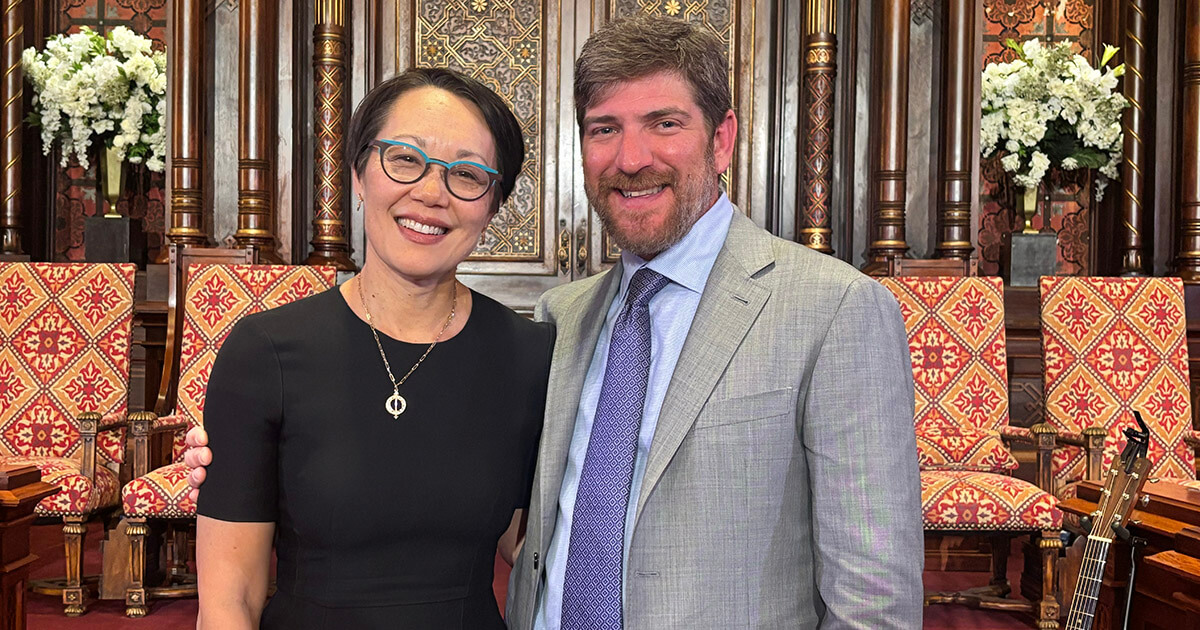Gourmet Kosher-for-Passover Getaways

Image by Courtesy of Kosherica
The Kosherica program at Atlantis Paradise Island is one of the many Passover getaways attracting families this year.
As Jews throughout the world prepare to commemorate the exodus of the slaves from Egypt, I am dreaming of a redemption of a different kind.
After all, the boxes of Passover dishes need to be hauled up from the basement and the kitchen needs to be scrubbed — it’s the ideal time to make my getaway.
Lured by ads featuring swanky Passover events at five-star resorts on beaches, mountains and championship golf courses, I envision a sojourn to a promised land where dishes never need to be washed and the tearoom — filled wall-to-wall with pastries — never closes.
Passover programs may vary in size and scope, but they all share the same essential element: an escape from the drudgery of cleaning a home for Passover and cooking a week’s worth of leaven-free meals.
Some 100,000 travelers will book 35,000 hotel rooms around the world for Passover this year, estimates Raphi Bloom, who has been tracking travel trends for the past 18 years and runs www.totallyjewishtravel.com, a travel internet site.
This year will be the busiest holiday season yet, as the customer base for Passover travel becomes larger and more diverse, and new programs have opened in , Mexico and the Caribbean, said Bloom.

Image by Courtesy of Diamond Club Passover Vacations
Diamond Club Passover Vacations features a program at a luxurious resort in Punta Cana.
Operators around the globe are promoting gourmet kosher vacations at locales that allow families to enjoy exotic adventures — such as a Safari in South Africa](http://www.totallyjewishtravel.com/passover_resorts/south_africa “”), kayaking in [Costa Rica and snorkeling in Mexico — while redeeming them from cleaning the hametz away.
Bloom warns me that programs are filling up earlier than in previous years and I begin to panic: Where will I spend the most celebrated Jewish holiday of the year?
I work the phones and find myself talking to an enthusiastic Elan Kornblum, Program Host at ClubKosher’s glitzy program in Puerto Rico. He boasts of his “big celebrity-chef lineup taking care of menus and poolside barbecues,” and my mouth begins to water.
Each of seven celebrity chefs will take a star turn in the kitchen during the week, Kornblum explains: Seth Warshaw of ETC Steakhouse will don his chef’s hat for the seders, presenting traditional Passover favorites as well as his own signature dishes. Sruli Eidelman from Izzy’s BBQ Addiction in Crown Heights will then take over the culinary helm with his weekday barbecues featuring ribs, brisket and other fare. Dairy and vegetarian menu specialist Chef Gino of Café Renaissance fame will be in charge for breakfast and lunch throughout the holiday and renowned cooking personality and “Top Chef” participant Chef Katsuji Tanabe of L.A.’s Mexikosher will run the show for the last days Passover.
Kornblum notes that the beachfront Caribe Hilton resort is opulent — with several swimming pools, a movie theater and golf course — and lists his program’s features: a day camp for kids, nightly entertainment, and daily excursions to local sites… you get the gist.
Kornblum, who confidently assures me that my family will love his program, makes it sound so tempting, I want to sign up on the spot. That is, until I discover that all the fun and fanfare comes with a $21,000 price tag (for my family of two adults and three kids), not including tax, tips and airfare. (He offered to reduce it to $19,000.)
Kosherica runs a similarly extravagant program at Atlantis Paradise Island in the Bahamas. There, guests can swim in one of 11 swimming pools and beaches, feed stingrays, swim with dolphins and play in the casino. That’s when they are not enjoying the pre-breakfast, post breakfast and bounteous barbecue.
Dinner menu highlights include oven-baked rack of veal and half roasted chicken with an orange glaze served with a side of honey glazed carrots, mashed potatoes and broccolini.
Among the lunch items served are eggplant rolatini, potato blintzes with caramelized onions, jalapeño jam and balsamic glaze. That program would set us back $27,000 for the ten days, not including airfare.
A program at the Trump Doral in Miami (run by VIP/RAM Catering) — with an impressive roster of scholars in residence – devotes an entire website page to its culinary offerings including homemade burrata, bocconcini, and fresh mozzarella, served with heirloom tomatoes, basil pesto, aged balsamic vinegar and Passover herb toast. A charcuterie bar features artisan delicacies such as pistachio-studded aufschnit, peppercorn-laced cervalet, goose paté, Westphalian rolled prosciutto, ringwurst and liverwurst. The program will also offer a daily “spa” buffet of “clean” healthy dishes with simple preparation that are low sodium, low fat and low carb.
That program demanded $28,000 for the week, giving me yet another reason to dislike the presidential candidate whose name graces that hotel.
It all makes me wonder: When guests at such resorts hunch over their haggadahs to ask the iconic question: “Why is this night different from all other nights?” could the answer possibly be “Because on this night we maxed out on our credit cards?”
Despite the hefty expense, programs book up fast. When I called in mid-March, hotels in Arizona, Orlando San Diego and Niagara Falls reported they were already sold out. The receptionist at a Las Vegas program snapped at me for calling so late and said she would call me back if a room opened up. I’m still waiting.
No matter, there are dozens of Passover programs to ogle. Some closer to home in Connecticut, New York and Atlantic City offered better deals, such as a program at the Chesapeake Bay in Maryland, whose bargain basement rate was $14,000 for the five of us.

Image by Courtesy of Hotel Gradus
The Israelites may have wandered in the desert with little to munch on for 40 years, but we are more than making up for our ancestors’ suffering. Instead of reminiscing in an appropriately barren desert, we live it up in posh hotels with palm trees, swimming pools and over dish after gourmet dish served by white-gloved waiters who bring us second helpings without making us feel guilty.
The programs offer daily prayer services, glatt kosher fare and lectures by distinguished speakers such as former ADL director Abraham Foxman, Ambassador Dennis Ross, former senator Joseph Lieberman and Jewish author and educator Erica Brown. But there are other types of amenities too, like spa treatments, golf clinics and entertainment by musicians and magicians.
The main attraction though, tends to be the food, which is served in abundance and is prepared by specially trained chefs who cook up menus that taste too good to be kosher for Passover. If there is one dictum in the Haggadah that is religiously observed by programs and participants it is this: “Let all who are hungry come and eat…”
Despite the preponderance of food, guests have an uncanny ability to be ravenous at every meal. At a program we attended in Florida one year, guests complained impatiently as they waited for the dining room doors to open before dinner. I know they weren’t famished because I had just seen them partaking of the vast array of sweets in the tearoom only moments before.
The tradition of journeying out of the house for the holiday began decades ago when east coast Jews went to resorts in the Catskills. The big heyday for the Catskills was in the 1950s and 60s, said Dr. Phil Brown, a professor of sociology at Northeastern University and President of the Catskills Institute, who recently authored “Summer Haven: The Catskills, the Holocaust, and the Literary Imagination.”
“Jews went up there in droves, we’re talking about a half-million people who would go up during a season. It was close by; it was heimesh. It was a time when Jews were not allowed in many other resorts.” Many of them spoke Yiddish and wanted to be where there was Jewish culture, said Brown.
By the 1970s, the Catskills began to decline. Miami Beach became a destination, as kosher hotels popped up along Collins Avenue. But in the past two decades, as resorts worldwide saw a financial opportunity, they launched kosher Passover programs.
Unable to survive amid the competition, many of the kosher resorts in the Catskills and Miami closed.
In recent years, the Passover program has evolved to include more exotic experiences, Brown observed. “People wanted to see the world. They wanted fancier accommodations,” said Brown. People are now flocking to far-flung places around the globe to have their Seders in glamorous destinations with lavish amenities.
If the Passover-resort phenomenon is emblematic of the success of American Jews, it may also indicate their desire to observe at the highest level: with sweet charoset rather than bitter maror.
As for me, I felt like the simple son from the Passover Haggadah: with an abundance of opulent options but no idea which to choose. I turned to my wise son, a teenager of few words and strong opinions. “Pesach is the best at home,” he advised.
As I thought back to my own childhood, I had to agree. Though my parents took my sisters and me to a variety of hotels over the years, my favorite Passover memory was the time a large crew of friends and relatives (including my Uncle Bob and his sheepdog Barkley) descended on our house for a boisterous holiday in which we talked and sang at meals that lasted well past the hour most hotel dining rooms would allow.
Yet, no matter where in the world Jews find themselves celebrating this year, they will all conclude the Seder in the very same way: by proclaiming “Next year in Jerusalem!”
It won’t require four cups of wine for most of us to really mean it. After all, it’s the eternal dream of every Jew to return to the Holy Land. And how hard is it to dream of being at such exquisite hotels as the David Citadel, the Dan Panorama and the Inbal.
Deena Yellin is a newspaper reporter in New Jersey whose work has appeared in The New York Times, Newsday and The Jerusalem Post.
















